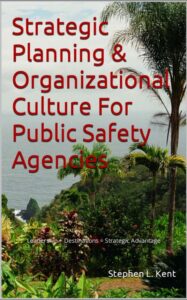 (Click on links within the text to read some of my related articles.)
(Click on links within the text to read some of my related articles.)
It could be the sunset for an industry … or the sunrise for a revitalized industry. Yet, unlike the timeless, unchanging behavior of celestial bodies, the future is all about choices, isn’t it?
So, here you are – and, goodness, it isn’t like you haven’t been trying for the past 125 – 130 years! Yet, despite all the short-sighted rules, regulations, projects, and fads; despite all the jargon, the “just-add-water” symptom-solving and “stats-worship,” no agency has truly achieved “The 4 Results That Matter.”
I will know that you have begun to achieve your Mission when the following, Four Results That Matter, are true statements:
- When employee safety is at the top of everyone’s list, all the time, every time;
- When your agency has adequate, sustainable, dedicated funding;
- When you have achieved a minimum of 90% satisfaction among your constituents with both the quality and the quantity of services you provide; and
- When you have achieved a minimum of 90% satisfaction among employees with job-related conditions.
Some in the industry want to believe they are under siege (according to the National Script) and are getting a fair amount of publicity in consideration for their victim-think and wild-eyed arm-waving; a few employees in a few agencies across the U.S. are behaving badly yet keeping their jobs; most employees are doing an excellent job but not getting credit for it; public safety funding is a form of political football in many piss ant towns and failed cities alike; the national media tends to focus more upon negative than positive; and a host of other symptoms.
One of the worst choices I can think of for Law Enforcement is to adopt a bunker mentality when true leaders should be using their time, talent and treasury to create a new dawn for the industry.
Negative consequences simply did not occur in the past decade. The public safety industry got here – on this day – as a consequence of innumerable decisions made over the past 125 – 130 years.
After more than 100 years of trying, perhaps it is time for some true change. The following “25 Choices To Re-position Law Enforcement” are intended to assist true leaders in their quest for Strategic Advantage.
Do you want to re-position Law Enforcement so it is an attractive, career-of-choice for people who are going elsewhere? Do you want to re-position Law Enforcement in the minds of your constituents? I offer these challenges:
1. Make certain there is an internal cultural commitment to effective marketing and community relations. There is no such thing as a “non-marketing” employee. When you and your team members are in the grocery store checkout line you ARE your agency and represent all of local government. Remember Peelian Principle #7: “Police, at all times, should maintain a relationship with the public that gives reality to the historic tradition that the police are the public and the public are the police; the police being only members of the public who are paid to give full-time attention to duties which are incumbent on every citizen in the interests of community welfare and existence.”
2. Improve public understanding of – and trust in – law enforcement as a highly-skilled, white-collar profession rather than as just another low-paying, blue-collar job within which there are “professionals.” It is one thing if outsiders see you as second-class citizens; it is quite another if you see yourselves as second-class citizens. Lead like you mean it. Click here for my article on Public Trust.
3. Stop confusing offenders (products) with taxpaying constituents (the customer.) Remember, it is ALWAYS the People’s money.
4. Improve consistency in educational requirements for positions throughout the industry. I have been talking about this one for more than 20 years and yet, here we are.
5. Elect people who believe in and support law enforcement and its value – and who are consistently truthful about it. Public safety is not “more” work of local government; it is THE work of local government.
6. Be aggressive in informing the public about YOUR agency’s story – especially your successes! We’re seeing more and more of this – especially using social media. Keep it up!
7. Change the structure of the funding mechanism. So long as you are in the “General Fund” people will continue to play political football with public safety. As my students and clients know, I am a vocal and unrepentant supporter of separate taxing districts for every Police Department and Sheriff’s Office I work with. We have Fire Districts, School Districts and other kinds of “special districts” … and neither County Commissioners nor Mayors nor City Council members nor legislators nor city administrators nor county administrators can take those dollars and spend them on other things. To those who say, “Well! We could NEVER give a Chief or Sheriff that much authority over their budget!!! We couldn’t trust them with that!!!” Hogwash. You gave them a gun, dummy. Ask your school superintendent, Fire Chief or others how they function. A former, and I stress former county commissioner once said to me: “Controlling the budget for the Sheriff’s Office is the only way I can control the Sheriff.” My response was, “Who the %#@* told you your job was to control another duly-elected official?!” I stress former county commissioner. (Now, if one Chief or Sheriff screws it up, fire them. But don’t take everyone else’s authority away.) In addition, a “sine wave” of budget ups and downs in any jurisdiction makes it impossible to tell any applicant, “You can have a career in this organization.” That is an overcommitment. In reality all you can say is, “You get to work here until someone does something stupid and screws up the local economy – then we have to eliminate your position … ” To prevail the industry needs sustainable, dedicated funding.
8. Change the staffing algorithm. The old, “officers per thousand” algorithm did not work, does not work and will not work. You MUST get this down to a human-sized chunk of work or you’ll continue to burn people out and drive qualified prospects to other careers. We cover how to do this in our Online, Live Academies. Click on this sentence to read another article that may provide further clarification.
9. Accept the fact that Law Enforcement is subject to the same requirements for effective leadership and management as the private sector. Yes, it is The People’s Business. Run it that way.
10. Change what you measure—and stop measuring silly stuff because some stats-fiend wants to justify their existence; measure only those things which are relevant to the constituent. Most agencies measure how they’re dealing with “symptoms” and rarely measure true, community-based problem-solving.
11. Stop focusing only on quantity and start also focusing on quality. Altogether too many things don’t get done in America because too many people who should know better are either lazy, unimaginative, fearful, selfish – or some combination of those four.
12. Stop believing it is only about money, salary, benefits and retirement funds. Stated simply: You cannot pay people enough money to buy off their alienation from a toxic work culture.
13. Cease being territorial – improve inter-agency collaboration at all levels. There must be a “seamless system” that consistently shows that it is making the best use of public resources before it is ever positioned to ask for more.
14. Exert political will to terminate the employment relationship when people choose not to perform. Ensure that you, your supervisors, a guild, a union and outside attorneys stop enabling those employees that everyone knows should not be here. If you don’t do that, I do not want to be in the meeting where you are trying to convince everyone else they should continue to care about the Mission, Vision and Long-Range Objectives.
15. Shorten the recruiting & selection process. Don’t “gut” it. Shorten it. What?! Do you think qualified people are out there sitting by the phone waiting for you, your HR department, attorneys, the civil service commission and others to get your decision-making act together? Decisive people are needed in Law Enforcement – yet, your decision-making process often telegraphs to them that they should go somewhere that can actually make a decision.
16. Do not leave recruiting – or anything else – in the hands of people who may have their own agendas. Just a reminder: Human Resources people should not make the final decisions on who gets recruited, hired, promoted, demoted or fired. Neither should Mayors, County Commissioners, City Council members, the janitor or the guy outside the window with the leaf blower. Such decisions must be left to those who have accountability for the final outcomes. All too often, staff support people have their own agendas while simultaneously trying to exert final authority over things without accountability for the outcomes if it blows up in our face. Staff support people should be advising you on HOW to get things done – NOT deciding WHETHER a thing can happen.
17. Focus on Brand Naming local and statewide Law Enforcement. I believe that one of the worst things to happen to the image of Law Enforcement has been the television show, “COPS”. Yet, many of my friends and acquaintances across the Nation still think it is cute. It’s not cute. It. Is. Not. Cute. Do whatever you need to do in conjunction with all other agencies and the community to brand Law Enforcement as a career of choice.
18. Balance symbolic isolationism with the fact that Law Enforcement Has A Face. Get out of your car. Get out of the building. You are members of the community as well. Have friends outside Law Enforcement. Have interests outside of your industry.
19. Eliminate “One Trick Pony” mentality. Law Enforcement consists of a LOT more than flashing lights, handcuffs and SWAT operations. When you think about it, given the range of behavior choices made by people in your jurisdiction, crime is a pretty rare event. There are thousands and thousands of ways to attract political, physical and financial support from citizens but, your recruiting videos rarely mention any of them.
20. Understand what prospective applicants want from a career. How are you going to know that unless you ask?
21. Eliminate any part of your culture that treats current employees as suspects. Ensure that your culture knows the difference between a mistake and willful misconduct. I know of an agency out there in the world where every – count them every – even chippy citizen complaint goes to Internal Affairs. What message does that give everyone in that organization about doing their jobs? What suffers? Productivity declines, innovation and creativity fall by the wayside and it teaches cops to lie. Yes, I said it again.
22. Cease undermining Academy doctrine. Either fix what the Academy is teaching, or more wisely choose who you appoint as Field Training Officers.
23. Corrections/Jail/Detention needs everyone’s help to bolster its image as a laudable CAREER rather than “just a job” or a stepping stone to Patrol. I know of places throughout the United States that, if you want a job, you must begin in the Jail. Then, if you’re very “good” and very patient, you can get “promoted” to Patrol. And, Heaven help you if you screw up on the road, you just might get your little butt remanded back to the Jail. C’mon, folks, what message does that give everyone – internally and externally – about the Detention/Corrections profession? If you want to make yourselves attractive to The People Who Pay The Bills Around Here – and qualified prospective employees – stop dividing yourselves up into shirts and skins and innies and outies. Sheriffs: please fix this. And, everyone else needs to stop taking their buddy’s paycheck for granted.
24. Stop spending all your time focusing on tactical details—including debating who’s right and who’s wrong—and start spending more time on STRATEGIC LEADERSHIP. Look over the horizon rather than at your feet.
25. Stop giving up too soon, avoiding anything new and choosing to undermine consideration of alternatives because you think they are “out of your control.”
Then, again, you can do anything you want in America, but there are consequences. I submit that every true leader in Law Enforcement has a personal obligation to make the kinds of sunrise choices that ensure more positive, effective consequences than they inherited from their predecessors.
Your call.
Oh, and a reminder: LISTEN to one another.
Go here to choose, schedule and pay for an Online, Live Short-Course:
Go here to register and pay for an Online, Live Leadership Academy:
Classroom Instruction
In-person classroom participation.
Academy Training Online, Live
This category includes all online, live academies: The Executive Academy (40 hours); The Sergeants' Academy (40 hours); The Leadership Academy (15 hours)
If you have questions or need assistance, use the red smiley face at bottom right, or email me at [email protected] or call 541.806.1502.





Please comment with your real name using good manners.